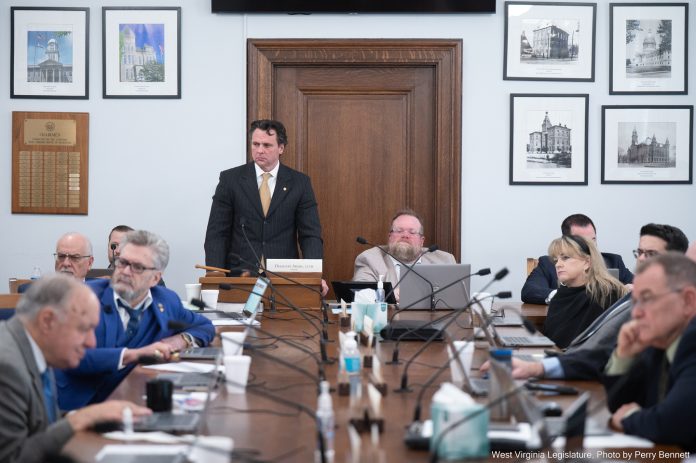The Judiciary Committee met this morning to consider the following legislation.
Markup & Passage
Senate Bill 474 eliminates the diversity, equity, and inclusion programs, training, activities, offices, and officers from the executive branch, primary and secondary schools, and higher education institutions. The bill requires state institutions to reallocate unexpended funds that would have been expended on diversity, equity, and inclusion projects. There is a complaint process for those aggrieved by violating the section in K through 12. The bill also prohibits teachers and county boards from using students’ preferred pronouns.
The counsel referred to the definition several times during the discussion. “Diversity, Equity, and inclusion” is defined as: any action, attempt, or effort to: (A) Influence hiring or employment practices concerning race, color, sex, ethnicity, or national origin, other than through the use of color-blind and sex-neutral hiring processes by any applicable state and federal anti-discrimination laws; (B) Promote or provide special benefits to individuals based on race, color, ethnicity, or national origin; (C) Promote policies or procedures designed or implemented about race, color, ethnicity, or national origin, other than to ensure compliance with an applicable court order or state or federal law; or (D) Conduct training, programs, or activities designed or implemented about race, color, ethnicity, or national origin, other than training, programs, or activities developed for the sole purpose of ensuring compliance with an applicable court order or state or federal law.
Some were concerned about limiting education and expressed that the definition is grouping three ideas together and not defining them separately. They also noted that DEI offices have helped students struggling academically with learning disorders such as ADHD. The definition in the bill does not account for everything DEI offices provide. Noted during the discussion were veterans and spouses, low-income, and underserved populations. Some of these types of DEI are allowed within the bill. The bill addresses race, color, sex, ethnicity, or national origin.
The Education Committee provided an amended bill, which the Judiciary Committee rejected. The committee moved forward with the Senate bill. The amendment would have provided the exceptions for women. The Senate version of the bill advances to the floor.
Senate Bill 586 requires appointments to vacancies for the offices of Secretary of State, Auditor, Treasurer, Attorney General, Commissioner of Agriculture, Justice of the Supreme Court of Appeals, Judge of the Intermediate Court of Appeals, member of Congress, or in any office created or made elective to be filled by the voters of the entire state, or judge of a circuit court or judge of a family court, to be made from a list of persons of the same political party with which the person holding the office immediately preceding the vacancy was affiliated at the time of the previous election for that office. The bill was amended and advanced to the floor.
Committee Hearing
Senate Bill 124 reduces the statute of limitations on actions to recover on oral and written contracts, on bonds of fiduciaries and personal representatives, and on recognizances. The bill states that the statute of limitations doesn’t start until the person has the right to bring a claim or knew or should have known they had the right to sue, whichever is later.
Current time limits are:
- 10 years for Written contracts, bonds, fiduciary/public officer bonds
- 5 years for Oral contracts or implied contracts
- 10 years for Recognizance (except bail)
- 10 years for Fiduciary account liability (after court confirmation)
The new time limits would be:
- 5 years for Written contracts, bonds, fiduciary/public officer bonds
- 2 years for Oral contracts or implied contracts
- 5 years for Recognizance (except bail)
- 5 years for Fiduciary account liability (after court confirmation)
Senate Bill 280 requires public elementary or secondary schools to display a durable poster or framed copy of the United States national motto, “In God We Trust” in a conspicuous place in the main building of every school or campus. The bill states that no public funds may be used for the motto.
Senate Bill 488 prohibits (1) the display of a candidate or candidate’s committee name, likeness, or logo; (2) the display of a ballot question’s number, title, subject, or logo; (3) campaign-related buttons, clothing, writing utensils that contain electioneering information; (4) distribution of campaign literature, cards, or handbills containing electioneering information; (5) soliciting of signatures to any petition; and (6) soliciting of votes for or against a candidate or ballot question. The bill allows cell phone use by voters within 100 feet of the entrance of a polling location so long as electioneering or loud or disruptive conversations do not occur.
Senate Bill 531 increases the penalty for assault of an athletic official to a fine of not less than $500 nor more than $1,000 or confinement in jail for not less than one nor more than six months, or both fined and confined. The bill also increases the penalty for battery of an athletic official to a fine of not less than $1,000 nor more than $2,000 or confinement in jail for not less than six nor more than 12 months or both fined and confined.
Senate Bill 864 clarifies the inference of criminal intent in a burglary prosecution.

